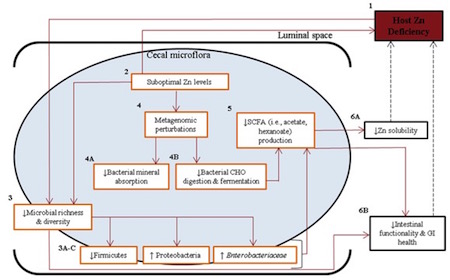
A press release published by Cornell University shares research that has found that zinc deficiency alters gut bacteria makeup and function:
The researchers used broiler chickens in the study, partly due to their omnivorous appetites – which allowed the researchers to feed them purified diets – and because of their fatty acids and genetic similarities to humans.
There is a great diagram in the actual study: Chronic Zinc Deficiency Alters Chick Gut Microbiota Composition and Function. It explains the proposed mechanisms by which a zinc-deficient gut microbiome may perpetuate a zinc-deficient state.

Figure 8. Schematic diagram depicting proposed mechanisms by which a Zn [zinc] deficient gut microbiome may worsen a Zn deficient phenotype. Zn deficiency (1), caused by insufficient dietary Zn (2), induces a decrease in gut microbial diversity (3), and an outgrowth of bacteria particularly suited to low Zn conditions, leading to dysbiosis [3A–C]. Lack of dietary Zn also leads to alterations in the functional capacity of the microflora (4), causing multiple effects including decreased expression of pathways related to mineral (i.e., Zn) absorption (4A) and carbohydrate digestion and fermentation (4B). A decrease in the latter pathway may also cause a depression in the production of SCFAs [short chain fatty acids] (5), compounds responsible for improving the bioavailability of Zn. Altogether, these microbial effects may decrease Zn absorbability (6A) and disturb GI health (6B), thereby perpetuating a Zn deficient state. Red arrows and orange–lined boxes denote observations of this study, and dashed arrows and black–lined boxes describe published findings.
The above is shared here under the Creative Commons Attribution License and can be found here: Reed, S.; Neuman, H.; Moscovich, S.; Glahn, R.P.; Koren, O.; Tako, E. Chronic Zinc Deficiency Alters Chick Gut Microbiota Composition and Function. Nutrients 2015, 7, 9768-9784.
Zinc status is notoriously difficult to assess so I am fascinated by the findings of this Cornell University study suggesting
a simple new way to test for zinc deficiency by analyzing a patient’s fecal sample and seeing if the profile of gut bacteria matches the makeup one would expect in a zinc-deficient individual.
The authors suggest that with additional research this zinc stool test could become a noninvasive biomarker for zinc deficiency.
Zinc deficiency is common, affecting 25 percent of the world’s population, especially in the developing world.
Zinc deficiency plays a major role in anxiety and depression. Here is a recent paper on the connection between low serum zinc, high CRP (a marker of inflammation) and pre- and post-natal anxiety and depression: Lower Serum Zinc and Higher CRP Strongly Predict Prenatal Depression and Physio-somatic Symptoms, Which All Together Predict Postnatal Depressive Symptoms.
New research, soon to be published by the Journal of Neuroscience by researchers at the University of Auckland, shows the importance of zinc in autism. The study looks at how zinc can affect brain cell communication that is altered at the cellular level.
The researchers suggest this research may have applications for psychiatric disorders such as schizophrenia (and presumably anxiety and depression too).
I feel that we have an under-recognized opportunity to have a bigger impact on mental and physical health if we take zinc deficiency more seriously.
Have you had your zinc status assessed and do you supplement accordingly?
If you’re a practitioner, do you regularly check the zinc status of all your patients/clients?
Zinc is a major antagonist to copper in body enzyme systems.
We published Brewer and MacArthur’s
review “Too much copper, too little zinc
and cognitive deterioration in Alzheimer’s
Disease” in October. 2013 Townsend Letter.
In the Oct. 2016 issue we interview Prof. Marco
Ruggiero of Univ of Firenze who makes
the case that our Microbiome represents our third
brain (our human gut being the second).
Given the disturbing role that copper has
on our brain it makes good sense that
the Microbiome is missing adequate zinc.
Dr Collin
This is a wonderful article – thanks for sharing. I’m going to share a link here for other blog readers to enjoy
http://www.townsendletter.com/Oct2013/copper1013.html
I agree that the inorganic copper in supplements (I recommend copper-free multi for this reason) and leached into water is a huge issue.
I’m not sure I agree with the authors on the avoidance of red meat since it is such a good source of zinc too, plus has the other benefits of omega-3s, amino acids, iron, B12 and helps with blood sugar stability. I would emphasize grass-fed red meat.
The over 50 issue of too much iron interesting, especially for postmenopausal women but also men. I recommend an iron-free multi in this instance and the red meat iron concerns for this population has now got me thinking and I’m going to look at some additional research.
For now this is a study I mention in many of my talks: A moderate-sodium DASH-type diet improves mood in postmenopausal women (https://www.ncbi.nlm.nih.gov/pubmed/22480799)- grass-fed red meat consumption in this study was associated with a decrease in depression.
I look forward to the October 2016 issue and love the 3rd brain concept!
Thanks for all that you do with the Townsend Letter! It’s a great publication for functional medicine practitioners and nutritionists.
Trudy,
Thank you for the amazing information and for all you do. It makes a world of difference. I read the article you posted about A moderate-sodium DASH-type diet improves mood in postmenopausal women. Can you please clarify what “DASH-type” means? I am relatively new to healthy eating, supplements, oils and anything to help correct the many health issues I have had over the years. Any help would be greatly appreciated.
Julie
DASH stands for Dietary Approaches to Stop Hypertension. The DASH diet is a lifelong approach to healthy eating that’s designed to help treat or prevent high blood pressure http://www.mayoclinic.org/healthy-lifestyle/nutrition-and-healthy-eating/in-depth/dash-diet/art-20048456
It’s been studied extensively and is very effective. I would modify it to focus on the vegetables, fats and proteins and remove all the grains, or at least gluten.
It’s been studied extensively and is very effective. I would modify it to focus on the vegetables, fats and proteins and remove all the grains, or at least gluten.
This is very interesting, as I am zinc deficient however when I try to supplement with zinc, it makes me vomit. Possibly the copper issue mentioned above. Any thoughts on how to supplement it in such a case?
Gemma
This is something I see with some clients. I have them try less of whichever zinc they are taking and take it in the middle of a meal and this often helps. If that doesn’t work then I’ll have them try another form.
I start my clients with Optizinc (no copper – some brands have both optizinc and copper). Others are zinc gluconate, zinc picolinate etc
Thanks so much Trudy. I’ll give it a try.
I was told by my ayurveda Dr.to buy a copper cup and let water sit in there overnight and drink at room temperature in the morning. This has great benefits as i read up on it. Im waiting for my cup to arrive. Whats your in take on tthis.
thanks.
Michele
It’s the first I’ve heard of this recommendation so I need more information to be able to comment. And ideally a link with more information
Hi Trudy, here is a link regarding the question of drinking from copper ware from Todd Caldecott. Todd is an ayurvedic practitioner, and I find his honesty and down to earth approach refreshing.
https://www.toddcaldecott.com/drinking-from-copper-healthy/
Caroline
Thanks for sharing this excellent article. I agree with all that I read and would avoid copper cups with drinking water, unless you know you have a copper deficiency, something which is not very common